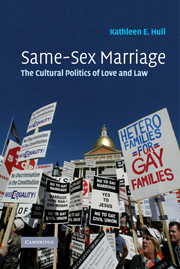Book contents
- Frontmatter
- Contents
- List of tables
- Preface
- Same-sex marriage timeline
- 1 Marriage, culture and law
- 2 Doing the rite thing: cultural practices of commitment
- 3 How do I love thee? Questioning the marriage model
- 4 Making it legal: marriage, law and legality
- 5 Sin or civil right? Debating marriage in the states
- 6 Conclusion: marriage and beyond
- Epilogue
- Appendix A Interview guides
- Appendix B Sample characteristics
- Appendix C Study participants
- Notes
- Court cases
- References
- Index
2 - Doing the rite thing: cultural practices of commitment
Published online by Cambridge University Press: 05 June 2012
- Frontmatter
- Contents
- List of tables
- Preface
- Same-sex marriage timeline
- 1 Marriage, culture and law
- 2 Doing the rite thing: cultural practices of commitment
- 3 How do I love thee? Questioning the marriage model
- 4 Making it legal: marriage, law and legality
- 5 Sin or civil right? Debating marriage in the states
- 6 Conclusion: marriage and beyond
- Epilogue
- Appendix A Interview guides
- Appendix B Sample characteristics
- Appendix C Study participants
- Notes
- Court cases
- References
- Index
Summary
Is not marriage an open question, when it is alleged, from the beginning of the world, that such as are in the institution wish to get out, and such as are out wish to get in?
– Ralph Waldo Emerson, Representative MenOn Valentine's Day 1999, Carol Moore and Judith Klein celebrated their six-year relationship in a commitment ceremony jointly officiated by a rabbi and a personal friend at a downtown Chicago synagogue. The ceremony contained many elements of a traditional Jewish wedding, but the ritual was also crafted to reflect the specific characteristics of the couple being united: same-sex, interfaith and feminist. Near the end of the ceremony, the rabbi invited ceremony guests to sign the couple's ketubah (Jewish wedding contract), which he called “a document which has far greater authority than any legal instrument,” and noted that Carol and Judith had taken each other as spouses “not yet in accordance with the laws of this state, but according to a much higher authority, the loving and justice-proclaiming law of the living God.” The ketubah listed several promises of mutual love and support and asserted the status of their commitment as a marriage, stating: “We make these promises intending our relationship to be treated as a marriage by ourselves and by all those we meet. This ketubah is evidence of our commitment to one another and should be construed by any government, court or public official as if the laws governing married persons applied to our relationship.”
- Type
- Chapter
- Information
- Same-Sex MarriageThe Cultural Politics of Love and Law, pp. 26 - 77Publisher: Cambridge University PressPrint publication year: 2006



